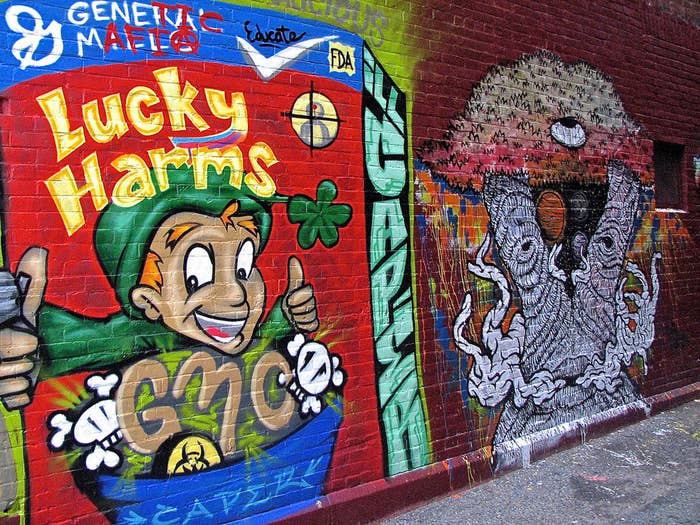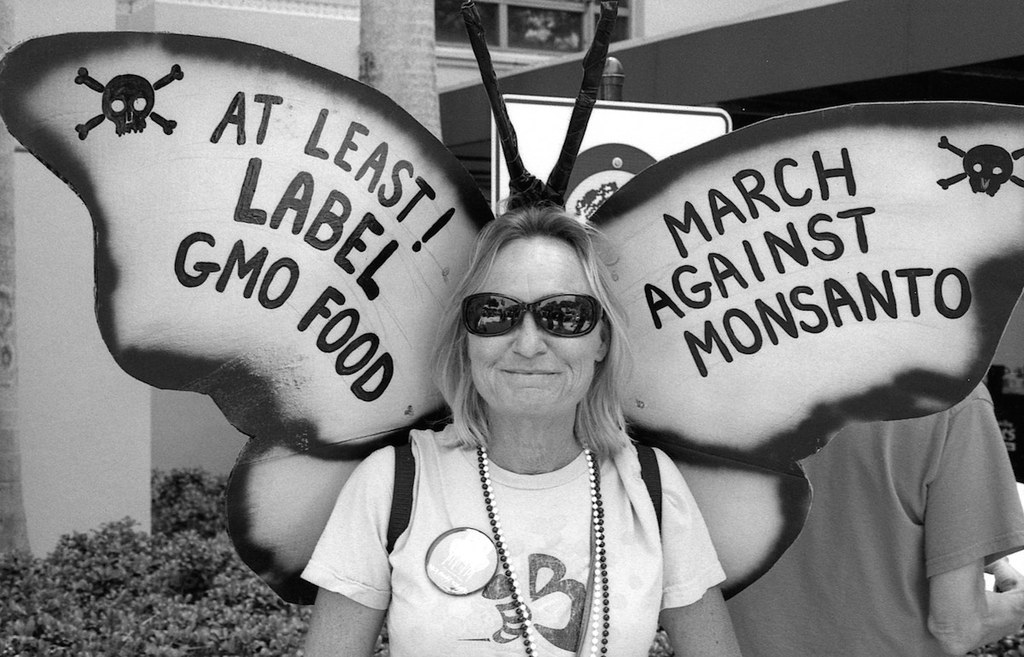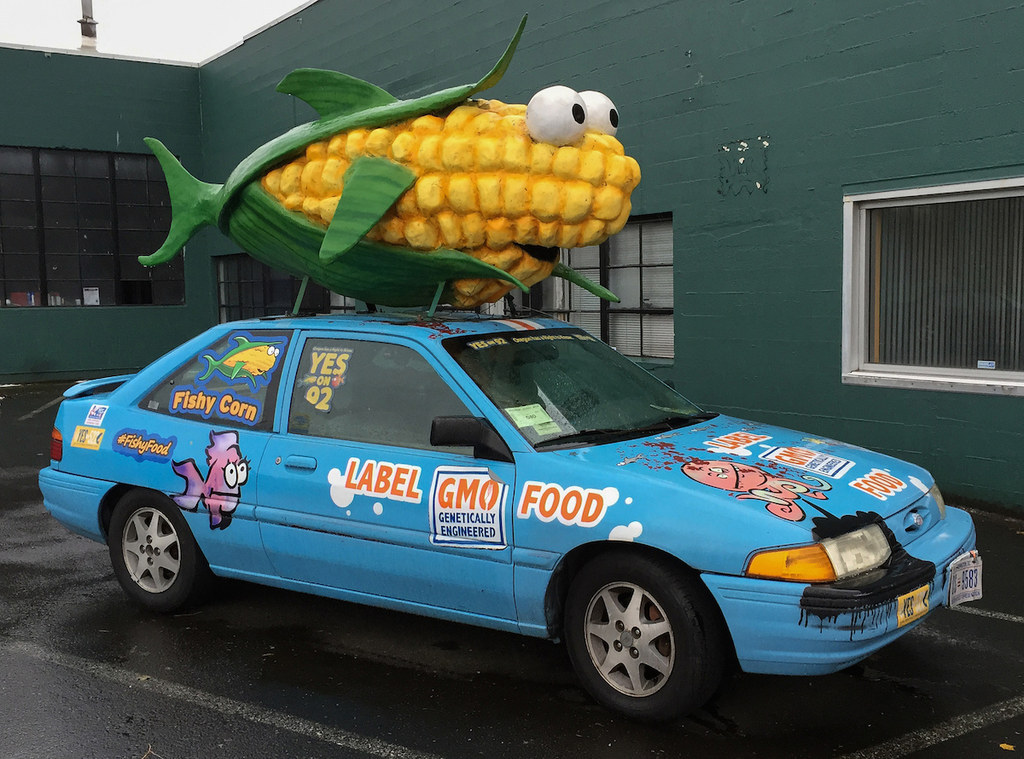In the capitol and statehouses across the country, lawmakers are fighting about whether grocery shoppers need to be warned that their cereals and salad dressings contain genetically modified organisms (GMOs).
Two competing federal bills are working their way through Congress that would override the mishmash of state-by-state labeling laws. One of the bills would enact mandatory labeling, whereas the other would make it voluntary.
The mandatory labeling bill is supported by Just Label It, a coalition of food companies — such as Chipotle, Stonyfield, and Ben & Jerry's — with marketing focused on the health and wholesomeness of their products.
On the other hand, many academic scientists, frustrated by a lack of consumer understanding around genetically modified food, agree with big ag that it's better not to draw attention to the fact that 80% of packaged foods in the U.S. now contain GMOs. Labels, they say, only stoke the public's fear of Frankenfoods, even though there's no evidence that GMOs are harmful.

Weirdly, this political fight is largely avoiding the question of whether GMOs are dangerous.
Powerful groups from the agricultural industry and politicians from states that rely heavily on grain production argue that genetically modified foods are no different from their traditional counterparts. They point out that certified organic food already can't contain any GMOs, so concerned consumers do have a choice.
"Labels tend to be seen as a warning label," Heather Denker, a spokesperson for Republican Congressman Mike Pompeo from Kansas, told BuzzFeed News. Pompeo is co-sponsoring the Safe and Accurate Food Labeling Act, which seeks to halt state-by-state mandatory labeling in favor of voluntary options. "We don't want to portray food as unsafe, when all the studies have shown they are safe."
Labeling advocates, meanwhile, say the issue is not about safety, but transparency. Business interests are trying to hide what's going into our food supply, they say, and consumers shouldn't fall for it.
"They're saying, shut up, don't ask us what this is, just buy it," Peter Welch, a House Democrat from Vermont, told BuzzFeed News. He co-sponsored the Genetically Engineered Food Right-to-Know Act, which would mandate labeling of all food containing GMOs above a certain threshold.
More than 60 countries have passed mandatory labeling laws, Gary Hirshberg, founder of the yogurt company Stonyfield Farm and Just Label It, told BuzzFeed News. "We want to join the rest of the world in helping consumers know whether GM ingredients are present."
The label lobby seems to be moving away — at least when talking to journalists — from the position that GMOs are dangerous, a point that's tough to argue when 88% of scientists think eating GMO food is perfectly safe. No studies have ever shown the crops to be more harmful than eating the traditional product.
"Our position is not that GMOs are good, bad, or otherwise," Hirshberg said. "We label lots of things, not because of safety concerns, but because people want to know."
For example, the FDA already mandates a number of labels that don't relate to safety, such as those noting that orange juice is "from concentrate" or made of X% juice.
Despite their careful talking points, a number of the companies in Just Label It, including Chipotle and Ben & Jerry's, have proudly purged GMOs from the bulk of their products:
And some advocates of mandatory labeling do argue that the technology is unsafe. Many also hold antiscience fringe views, such as claiming that vaccines are dangerous. For example, the popular site Natural News, which regularly runs anti-vaccine articles, also produced this video calling GMOs "poison":
Anti-labeling groups are quick to point out these contentious ties.
"The same people who advocate for labeling are the same people who oppose vaccines," Claire Parker, a spokesperson for the Coalition for Safe Affordable Food, a major lobbying group for the food industry, told BuzzFeed News.
Foods containing GMOs have been on the shelves since 1996.
To create a genetically modified crop, scientists typically insert a short genetic sequence into a plant's DNA to convey a given trait, whether resistance to pesticides, bugs, or cold. Once those initial plants are created, the seeds produced by those plants will inherit the trait. Some GMOs are made by "silencing" undesirable genes, or have several genes added to their DNA.
You've almost certainly eaten GMOs. In 2014 nearly 95% of U.S. corn and soy planted was genetically modified. Cotton, sugar beets, and many other crops are also commonly genetically engineered. Anything labeled "vegetable oil" is probably soybean oil, whether it's in salad dressing, bread, canned tuna, or the crayons your kids chew on. And corn is in everything too, rounding out the flavor profile of processed food, feeding the yeast in your beer, and keeping your powdered sugar silky.
Few who oppose mandatory labeling will admit the biggest fear: that when just 37% of Americans think GMO foods are safe, a label that draws attention to this ubiquity might frighten buyers, lowering prices of genetically modified crops and forcing farmers to return to traditional crops that may have lower yields or require more labor-intensive maintenance.

State-by-state regulation would be a total mess.
Labeling proponents say that big ag companies are pushing for Pompeo's bill for national voluntary labeling so that they can avoid dealing with state regulation.
"This [bill] gives the appearance that they're in favor of transparency, but really it gets them not to have to fight at the state level," Hirshberg of Just Label It told BuzzFeed News.
Nobody wants a state-by-state solution. It would be wildly impractical, not to mention expensive, for national and international food companies to make 50 different packages for U.S. markets alone. Enough states mandating labeling, then, might force companies' hands nationwide.
So far, mandatory labeling has passed in just three states: Connecticut, in 2013, and Vermont and Maine in 2014, though Connecticut's and Maine's laws require four neighboring states to pass similar laws before they go into effect. The Grocery Manufacturers Association is suing to overturn the Vermont bill, which will go into effect in 2016. And five other states have legislation pending.
"[Companies] complain about it, but the way to get around it is to agree to a national standard," Welch, the mandatory labeling bill's co-sponsor, said.
That seems unlikely. According to Welch, even if the voluntary labeling bill makes it through the House — a vote is expected sometime this month — it won't make it out of the Senate. As for the mandatory labeling bill, this is the second time it's been introduced; the first time, in 2013, the Senate voted it down.

Claire Parker is a spokesperson for the Coalition for Safe Affordable Food, of which the Grocery Manufacturers Association is a member. An earlier version of this post incorrectly said she was a spokesperson for GMA.
Gary Hirshberg is the founder of Just Label It. An earlier version of this post misspelled his name.


